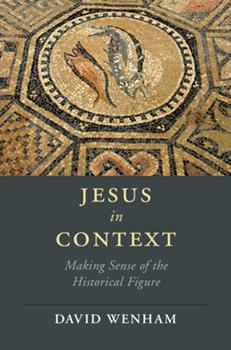Q. Jesus’ choice of the particular 12 he did choose—four fishermen, one or two tax collectors, one or two former zealots of some sort seems in itself an unlikely grouping of persons, indeed a grouping of persons already at odds with one another. Would you see this as some sort of statement of ‘can’t we all just get along’ and love our neighbors even our enemies? In short, would you see this as an enacted parable of what the kingdom community should look like?
A. Yes indeed. I see Jesus ‘new commandment’ to love one another of John 13:35 as hugely important for the first Christians. In John 13 it follows Jesus’ washing of the disciples’ feet and precedes the passion – very practical loving and very humble serving. Jesus says in John that this is to be the distinctive mark of his followers. The same idea comes out in Matthew, Mark and Luke, where Jesus speaks to his disciples about leadership and says that they are to be different from worldly leaders who like to rule and dominate; instead his followers are to serve – he uses the word ‘slave’ – ‘for the Son of man came not to be served, but to serve and give his life as a ransom for many’ (Mark 10:45). I see the same idea in Paul’s letters, most notably in Galatians 6:2 where Paul refers to bearing one another’s burdens and so to ‘fulfil the law of Christ’ and in 5:9 where he says ‘through love be slaves of one another’. Jesus’ community was indeed to be a lived-out picture or parable of God’s kingdom.
Q. Let’s talk about the family of faith concept which begins with Jesus and carries on in early Christianity as particularly evidenced in Paul’s letters. It is said to have priority at least over one’s obligations to one’s physical family, at least for some of Jesus’ disciples. Notice how Jesus on the cross in John bequeaths his mother to his beloved disciple, and vice versa, not back to his brothers and sisters who at the time were not Jesus’ disciples. This is a pretty radical thing to institute not only in Jesus’ day but in our own. What we tend to mean by a ‘family church’ is not a church which is a spiritual family for everyone who is present or is a member, but rather a church which nurtures nuclear physical families and neglects the priority of the family of faith. The church serves the status quo, rather than instituting a new kind of family. What do you think Jesus would think about the church as it exists today in regard to this matter? Do you think he would have agreed with Loisy’s famous quip— Jesus preached the kingdom but it was the church which showed up?
A. Yes and no to Loisy! The church has often not lived out the kingdom of God, sometimes exactly the opposite.. But I don’t think the first Christians got Jesus wrong. They and a lot of Christians since have demonstrated the love and community spirit of which Jesus spoke – imperfectly, but really. I quite like to translate Matthew 5:16 ‘Let your light so shine before people that they may see your beautiful works and glorify your Father in heaven’. The call to the church is to be a beautiful people. And yes a beautiful family. The thought of the church as a family is important, with Jesus speaking of his followers as his family and with Paul (and others) addressing fellow-Christians as ‘brothers’ (including sisters!). I agree that there is a tendency for us in modern church life to focus the physical human family rather than on the family of faith, which reflects the values of our secular society. Not that the physical family is unimportant: Jesus endorsed the fifth commandment ‘honour your father and mother’, and the ‘household codes’ in the NT letters emphasize and teach about the responsibilities of parents and children. It is a proper priority in the contemporary church to nurture family life in face of all sorts of threats, as well as to do everything to build up the life of Christ’s family the church.












